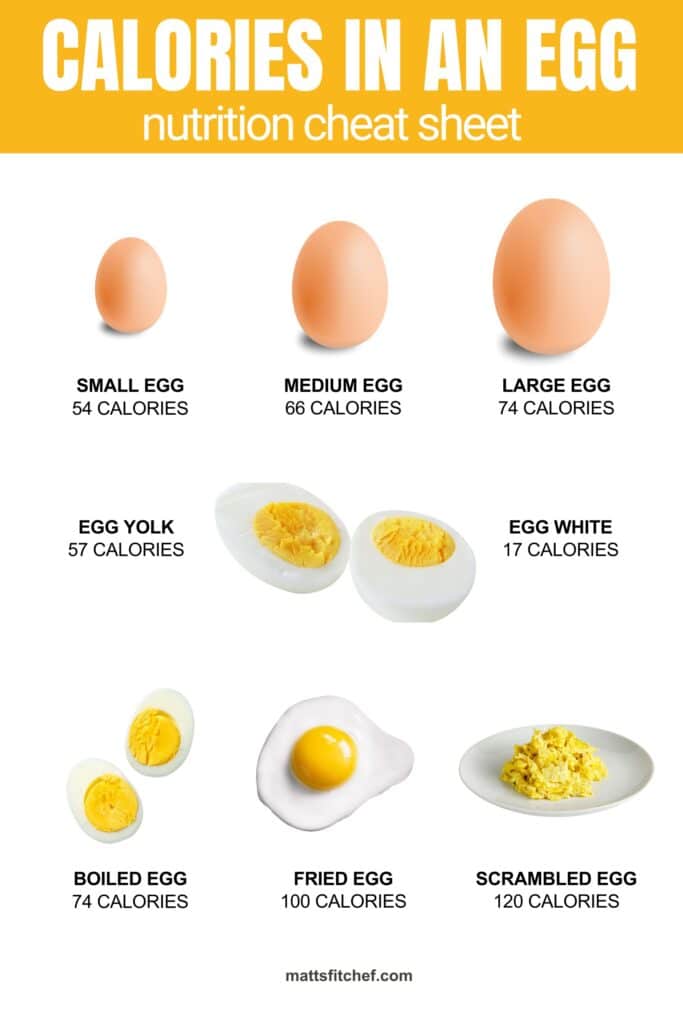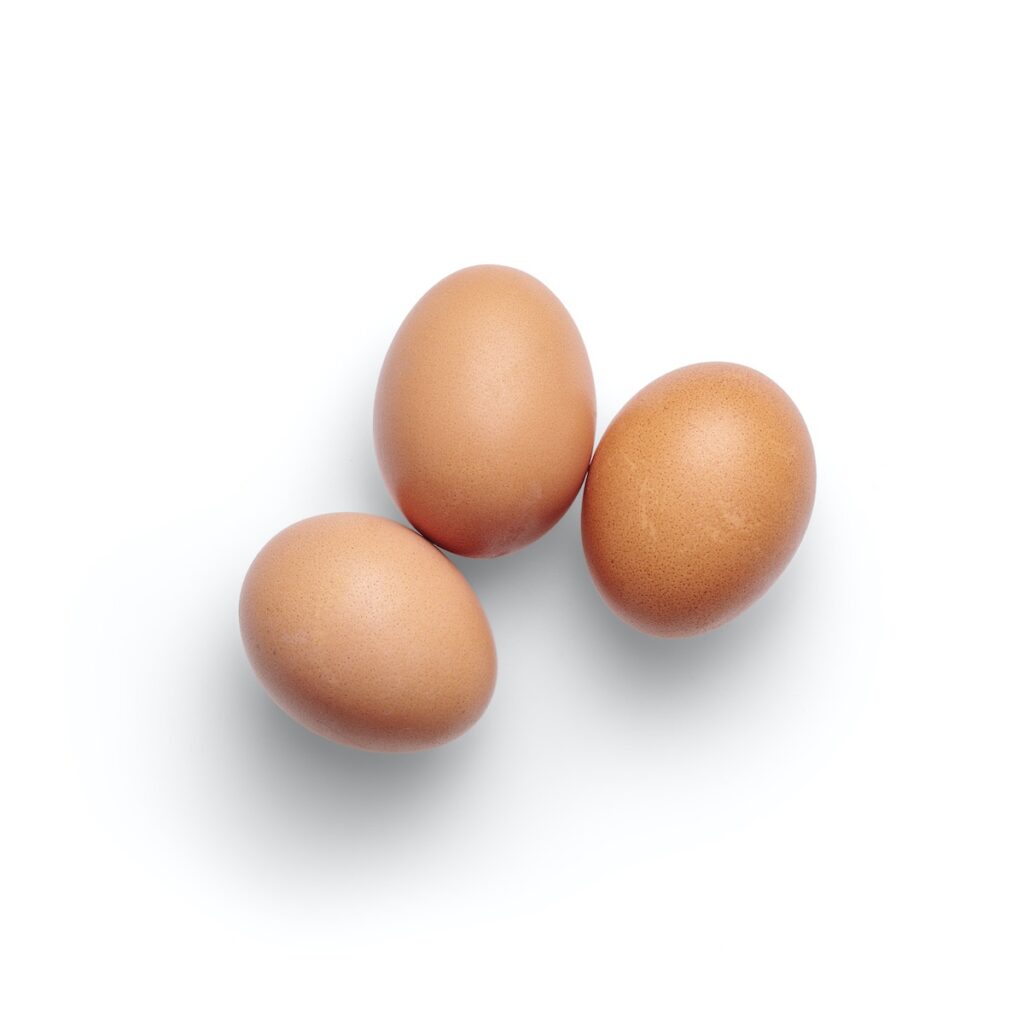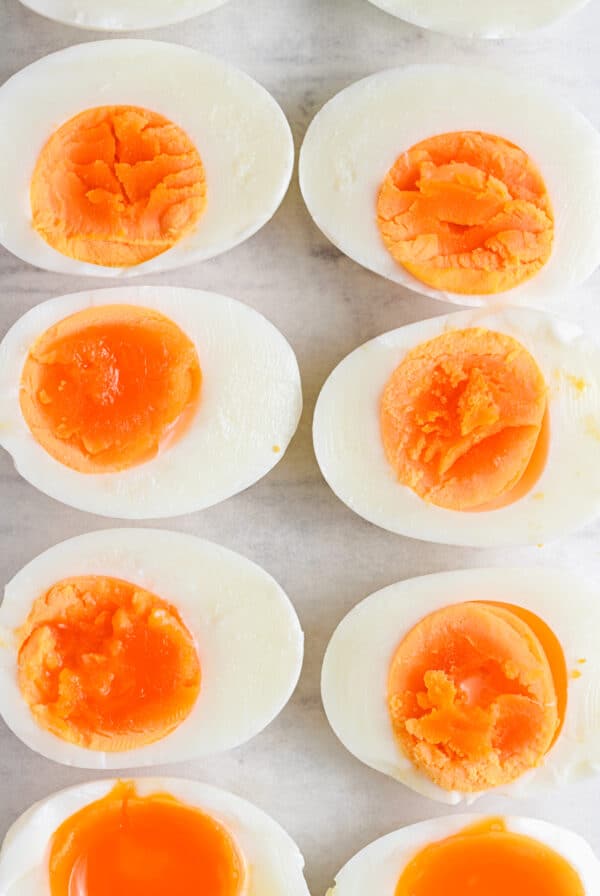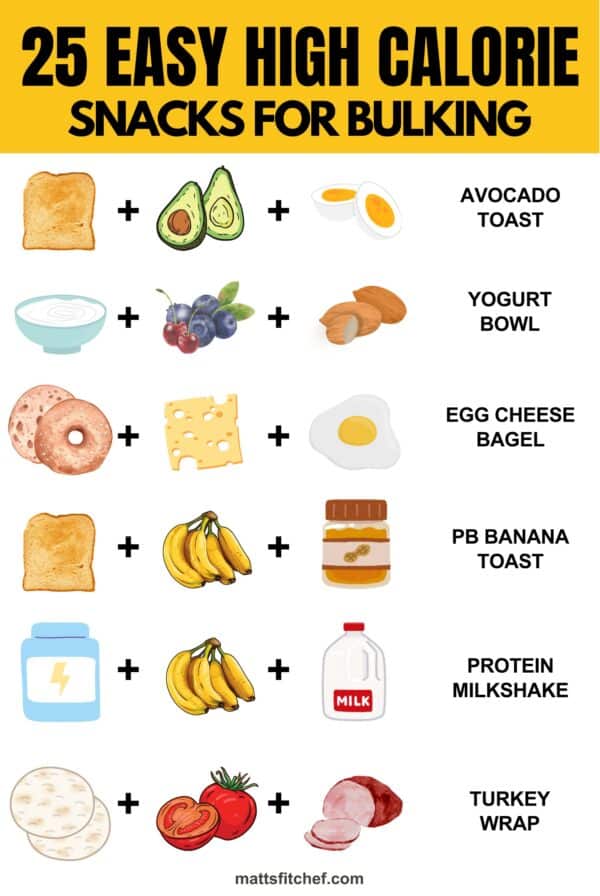As an Amazon Associate I earn from qualifying purchases.
Eggs are one of the most popular foods all around the world. Thanks to their versatility, people like eating them on a regular basis, in many different ways. That’s why you may be wondering…“How many calories in an egg?”
When it comes to figuring out the calories 1 egg has, there are many factors that come into play. Is it boiled or scrambled? Is the omelette with yolk or just with the whites? What’s the size of the egg?
In this article we are going to break it all down and give an answer to all your questions.
Table of Contents
The calories in egg
If you’ve ever been grocery shopping, you may probably know that not all eggs are the same. Size is the main difference. In general, eggs are classified in 3 sizes: small, medium and large. It goes without saying that the size has an impact on nutritional values: larger eggs have more calories than smaller ones.

Here you can find the macronutrient composition and egg calories according to its size. For the sake of simplicity, we are now going to refer to a whole chicken egg cooked without additional ingredients:
- Small egg: 54 calories
- Medium egg: 66 calories
- Large egg: 74 calories
| Small Egg Nutrition | Medium Egg Nutrition | Large Egg Nutrition | |
|---|---|---|---|
| Energy (kcal) | 54 kcal | 66 kcal | 74 kcal |
| Energy (kj) | 225 kj | 276 kj | 308 kj |
| Total Fat | 3.68 g | 4.37 g | 4.97 g |
| Saturated | 1.14 g | 1.36 g | 1.55 g |
| Monounsaturated | 0.50 g | 0.60 g | 0.68 g |
| Polyunsaturated | 1.14 g | 1.67 g | 1.90 g |
| Cholesterol | 157 mg | 186 mg | 212 mg |
| Sodium | 52 mg | 62 mg | 70 mg |
| Total Carbohydrates | 0.28 g | 0.34 g | 0.38 g |
| Protein | 4.65 g | 5.54 g | 6.29 g |
Calories in egg yolk and egg white
As you may know, eggs are composed by two main parts: egg white and yolk. While the white is higher in protein and lower in calories, the yolk represents the real nutrient powerhouse, packing in plenty of minerals and vitamins. Because of their different composition, these two parts do not provide the same amount of calories. Surprisingly, the calories in one egg white are only 17, all the rest comes from the yolk! Down below you will find a more detailed breakdown:
- Egg white calories (large): approximately 17 calories
- Egg yolk calories (large): approximately 57 calories
It is essential to remember that both parts should be consumed regularly, but in different amounts. While you may want to abound with egg whites to load up on protein, the consumption of yolks shall be limited to one to two per day. This way you’ll be able to get all the nutritional benefits that the food has to offer while staying within your calories.

What influences the calories in an egg?
At the beginning we have seen that, on average, a medium egg has about 66 calories. This is however a rough estimate, because in reality there are many aspects that influence the egg kcal. So, let’s dive deeper into the matter and see what those factors are.
- Size: As mentioned earlier, larger eggs are generally richer in nutrients than smaller ones. The difference is of about 20 calories.
- Egg white vs. egg yolk: There is a significant difference between the macronutrient composition of these two parts. If a white has just 17 kcal, the yolk is rich in fats and therefore provides more energy (egg yolk calories: 57 kcal).
- Diet of the chicken: Surprisingly, also the diet of the chicken that laid the egg can impact its nutritional values. Chickens that are fed a nutritious diet tend to produce eggs with higher nutritional quality, especially with respect to the amount of omega-3.
- Cooking method: This is probably the factor that can mostly impact the 1 egg calorie value. If boiled or poached eggs are usually cooked without additional ingredients, scrambles or omelette are often prepared with oil and fats. Considering that one tablespoon of olive oil has over 120 kcal, the calories of your meal can easily skyrocket.
One egg calorie by preparation method
In the previous paragraph we have seen that the factor which can mostly shape the nutritional values is the way of preparation. Simple cooking methods like boiling or steaming are lighter than frying eggs with oil and cheese.
Here’s a general overview of the approximate egg cal content based on common preparation methods. It is worth mentioning that the following information refers to a large egg, as this is the most common size.
- Boiled egg calories: A large boiled egg contains around 72-76 kcal, if cooked without additional fats.
- Poached egg calories: A large poached egg contains roughly 72-76 calories, if cooked without additional fats.
- Fried egg calories: As it is usually made with oil or butter, the calories of fried egg sum up to about 90-100. This number can quickly increase, if large amounts of fats are used.
- Scrambled egg calories: On average a scrambled egg contains about 100 to 120 calories, depending on how you prepare it. However, if scrambled with plenty of butter or oil, this value can quickly double or triple.
- Omelette calories: Giving an estimate for omelette is hard, as this dish is usually made with additional ingredients such as cheese, ham and oil. A plain, two-egg omelette without fillings may have around 140-160 calories, while omelettes stuffed with cheese and ham can easily be over 300 kcal!
- Egg white calories: The one boiled egg calories without yolk amount to 17, if cooked without fats.
| Boiled Egg Nutrition | Fried Egg Nutrition | Scrambled Egg Nutrition | |
|---|---|---|---|
| Energy (kcal) | 72 -76 kcal | 90 – 100 kcal | 100 – 120 kcal |
| Energy (kj) | 301 -317 kj | 376 – 418.4 kj | 418.4 – 502 kcal |

What are the nutritional benefits of eggs?
Eggs are considered one of the most nutritious foods on earth. Besides being an excellent source of protein, they contain a wide array of vitamins, minerals, and healthy fats. Here are the key reasons why eggs are good for you:
- Complete protein source: Eggs are one of the few foods that contain all nine essential amino acids, the building blocks of protein that are crucial for repairing muscle tissues, supporting the immune system, and producing enzymes and hormones in your body. Moreover, the protein egg whites will help you stay full for longer and prevent overeating.
- High-quality protein: Besides being a complete protein source, the protein in eggs have a high biological value. This means that all amino acids are efficiently absorbed and utilized by the body.
- Vitamins: The yolk is rich in essential vitamins, including vitamin A, vitamin D, vitamin E and various B vitamins (B12, riboflavin, folate).
- Minerals: Besides vitamins, eggs (especially yolks) are an excellent source of minerals such as iron, phosphorus and selenium. Furthermore, this food contains choline, a nutrient that is critical for brain health, nerve function, and the synthesis of neurotransmitters.
- Healthy fats: Although higher in calories, you should never avoid yolks. The yolk is rich in healthy unsaturated fats, which are beneficial for heart health and may help reduce the risk of cardiovascular diseases.
- Low in carbohydrates: Eggs are naturally low in carbohydrates, which makes them a great food for low-carb and keto diets.

How to make low calorie eggs?
In this blog post we have seen that eggs are a healthy food with plenty of nutritional benefits. If prepared in the right way, they can be consumed regularly also if you are on a diet. Here are some tips on how to cook eggs low calorie:
- Boil or poach: Cooking without added fats is one of the easiest ways to enjoy all the taste and nutrients of this food with minimal calories.
- Use non-stick pans: If you prefer frying, make sure to use a non-stick skillet or calorie-free cooking sprays. This will keep both fats and calories down.
- Avoid frying: Avoid frying or deep-frying your eggs, as this adds plenty of unhealthy fats and calories. Prefer lighter cooking methods such as boiling or steaming.
- Include vegetables: Instead of stuffing scrambled eggs or omelette with cheese and bacon, prefer vegetables like spinach, tomatoes, bell peppers, mushrooms, or onions.
- Add seasonings: As an alternative to butter and sauces, enrich the flavor of your dishes with herbs and spices.
The calories of fried egg are typically higher because of additional oil used for frying. The egg fried calories may vary based on amount of oil used and absorbed during cooking, but they are usually about 90-100 kcal each.
Two eggs typically contain around 140-150 calories in total. This may vary slightly based on their size and cooking method: calories in fried egg are often higher.
A grade A egg contains around 70 calories, depending on size and preparation. The energy provided remains the same, regardless of classification grade.
Egg whites prepared without additional fats are low in calories and fat but high in protein, making them a nutritious choice for a healthy diet. They also contain some vitamins and minerals.
As they are a great source of protein and do not contain fat, eating 10 egg whites a day should not be an issue. However, it’s important to balance your diet with other nutrients and consult with a healthcare professional for precise directions.
Bottom line: How many kcal in an egg?
With approximately 70 calories each, eggs are a great food to incorporate in your diet. They provide an excellent source of high-quality protein, healthy fats, essential vitamins and minerals.
When determining the one egg calories, there are many factors you should consider. Yolk vs. white, size, diet of the chicken and cooking methods to cap it off. If boiling the egg won’t add extra calories, frying with oil or butter may significantly change the nutritional values. So, when cooking eggs low calorie, choose simple preparation methods such as boiling or poaching.
Healthy and low calorie recipes with eggs
- Deviled egg potato salad
- Simple potato fritters
- Easy zucchini fritters
- Veggie nuggets
- Keto microwave egg muffin
- Healthy microwave cheesecake
- Protein cheesecake
Disclaimer: The nutritional information provided in this blog post are of informative nature only. For nutritional advices, consult your doctor or dietitian.



